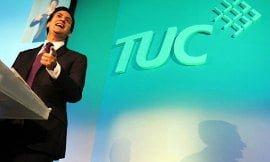Labour Party members and trade unionists have been given just one short month to digest and discuss the new “reforms” on trade union affiliation to the Labour Party. Steve Jones examines the likely impact of the internal changes being presented by Ed Miliband.
Labour Party members and trade unionists have been given just one short month to digest and discuss the new “reforms” on trade union affiliation to the Labour Party, being presented by Labour leader Ed Miliband, before they are voted on at a special conference in London on March 1st. Incredibly this conference is set to last just two hours. Many will rightly be asking, where is the democracy in this? Surely adequate time should be given to discuss this throughout the whole movement before a full debate at a Labour Party conference. Instead this new plan is being pushed through with little chance to intervene. Given that these new plans involve no actual real increase in democracy or rank and file participation whatsoever, we should not be surprised.
What is being proposed? Most party members will have no idea at all given the complicated “fudge” which has been worked out by the party officials. Under pressure from the main unions, the original “break the union link” concept, whipped up by the Tory press and the Blairite relics at Westminster, has been quietly put to one side. Indeed, the Labour-union link remains, with the trade unions holding 50% of the vote an national conference and seats on the Labour Party National Executive Committee.
Instead of any breaking of the link, we are getting a new category of affiliated TU member, to be introduced over a five-year period. Only then will TU affiliation levels be re-calculated, based on those trade unionists who have declared a regisistered support for Labour. These new LP-supporting affiliated members will then get an extra say in party affairs – how much in reality we will come onto later.
Party officials have stated that they expect a high proportion of trade unionists to give their consent to be listed as Labour supporters. Why not when it only makes sense to pay a political levy if it goes to supporting a political intervention, which for most people means supporting Labour? However, given the failure of the Labour leaders to put forward a clear alternative to Tory policies and given that Labour may well be in office during most of this transitional five-year period, carrying out many of the same policies as we are seeing from the current government, it is quite likely that many trade unionists may hold back from giving support out of anger and disappointment.
Far from increasing trade unionist involvement in what happens inside Labour, something we should all want to see, what may well happen is that some of the paid levy funds will not go to Labour in the form of affiliation fees anymore but instead go into various unions general political funds. This is already the case with Unison, where members can pay a political levy but have to state if they wish it to be used for affiliation to the party. The pressure will then be on for unions to use this other money to make additional donations to the Labour Party in order to ensure that elections can be fought. These donations will involve no rights, no participation and no say. The only people who will have any voice will be the trade union general secretaries who can negotiate funding, behind closed doors, for Labour in return for various deals, etc.
So what do you get for declaring your support for Labour? Well you will get a load of e-mails and letters asking for cash and help in canvassing during elections. You will also get a vote in any leadership election… and that’s it! Even that vote will mean little.
The new plans remove the MPs vote from the old Electoral College, which has handled leadership elections in recent years, something the Blairites have kept very quiet about in all their rants about trade union voting. Instead of the Electoral College for leadership elections – formerly consisting of representation split three way between MPs, affiliated unions and societies, and LP members – there will now be a system of “one member one vote” for all LP members and registered supporters.
The MPs, however, will still choose who can stand and the level of support from them needed to get on the ballot is to be pushed up to 20%. The aim is to be absolutely certain that only establishment candidates can stand as leader. At the last leadership election, John McDonnell was kept off the ballot despite many activists wanting the choice to vote for him. This new higher level requirement means that these new affiliated members, alongside ordinary party members and so-called “registered” supporters, will be stuck having a vote but only between Tweedledee and Tweedledum. No choice at all!
If the Labour leadership was really serious about increasingly the involvement of ordinary people in what happens to Labour, then they would be going out together with the unions to build both party membership and the involvement of those members inside the party, not just in the odd election every so often. The party needs full trade union involvement at all levels to ensure that the working class has a political voice.
The prerequisite for this, however, is the policies to enthuse and motivate workers and youth. This means making a break from the old “Tory-lite” policies being pushed forward at present, including a commitment to fight austerity and end the anti-trade union laws. No-one is going to be encouraged to get involved in Labour, baring the usual layer of careerists, by the chance to vote in a leadership election.
Certainly no one is going to be excited by such crazy ideas as having a US-style primary election for the Labour Candidate for London Mayor. In passing, we should note that in the US, primaries are used to ensure that only the very rich or those with rich backers can get on the final ballot sheet. The Tea Party was able to get it’s favoured people onto ballots over more establishment figures mainly because of a huge funding that it got from wealthy backers.
Miliband’s proposals talk of ”repairing the trust” between ordinary people and Labour. That means a change in policies and actions, not a rejigging of internal party procedures. When the new proposals were announced in the national press under the heading “Miliband’s Revolution”, one commentator on TV made the point that, when she saw this headline, she wondered if it meant that Labour was going to take action on poverty or low pay or the housing crisis – a real revolution – and not more fiddling of the party workings. This, she said, is what people want.
If Labour wants to really address the issue of democracy then it should deal with the failure to act on what party members and voters really want – an end to this system of endless crisis and attacks on working class standards.






